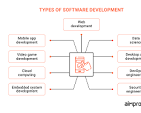Mastering Software Development Through a Comprehensive Tutorial
The Ultimate Guide to Software Development Tutorial
Software development is a crucial skill in today’s digital world. Whether you’re a beginner looking to learn the basics or an experienced developer aiming to enhance your skills, a software development tutorial can be immensely beneficial.
Why Choose a Software Development Tutorial?
A software development tutorial provides structured guidance and resources to help you understand programming concepts, languages, tools, and best practices. It offers hands-on experience through practical examples and projects, allowing you to apply what you learn in real-world scenarios.
Key Benefits of Software Development Tutorials:
- Structured Learning: Tutorials break down complex topics into manageable sections, making it easier for learners to grasp new concepts.
- Hands-On Practice: Interactive exercises and coding challenges help reinforce learning and improve problem-solving skills.
- Community Support: Many tutorials come with forums or online communities where learners can ask questions, share knowledge, and collaborate with peers.
- Career Advancement: Mastering software development through tutorials can open up new career opportunities and enhance your professional growth.
Tutorial Topics You Might Explore:
There are various areas of software development that you can delve into through tutorials, such as:
- Web Development (HTML, CSS, JavaScript)
- Mobile App Development (iOS, Android)
- Database Management (SQL)
- Version Control (Git)
- Software Testing
In Summary
A software development tutorial is a valuable resource for individuals looking to build their programming skills and advance their careers in the tech industry. By following structured tutorials and putting theory into practice, you can become proficient in various programming languages and tools. Start your software development journey today with a comprehensive tutorial tailored to your learning goals!
9 Benefits of Software Development Tutorials: From Structured Learning to Career Advancement
- Structured learning approach
- Hands-on practice with coding exercises
- Access to a supportive online community
- Opportunity to learn new programming languages
- Enhancement of problem-solving skills
- Preparation for real-world software development projects
- Career advancement through improved technical abilities
- Flexibility to learn at your own pace and schedule
- Cost-effective alternative to formal education programs
Challenges of Software Development Tutorials: Personalization, Relevance, and Interactivity
- May lack personalized guidance tailored to individual learning styles and pace.
- Some tutorials may become outdated due to rapid advancements in technology, requiring additional research to supplement the learning.
- Limited interactivity compared to live instructor-led training sessions, which may hinder immediate feedback and collaborative learning opportunities.
Structured learning approach
The structured learning approach offered by software development tutorials breaks down complex programming concepts into manageable segments, making it easier for learners to understand and progress systematically. By following a well-organized curriculum, individuals can build a strong foundation in coding principles and gradually advance their skills in a logical manner. This methodical approach ensures that learners grasp each concept before moving on to more advanced topics, fostering a solid understanding of software development principles.
Hands-on practice with coding exercises
Hands-on practice with coding exercises is a key advantage of software development tutorials. By engaging in practical coding tasks, learners can reinforce their understanding of programming concepts and improve their problem-solving skills. These exercises provide a hands-on approach to learning, allowing individuals to apply theoretical knowledge in real-world scenarios and gain valuable experience in writing code. Through consistent practice and experimentation, students can build confidence in their coding abilities and develop the proficiency needed to tackle complex programming challenges effectively.
Access to a supportive online community
Access to a supportive online community is a significant advantage of software development tutorials. Engaging with like-minded individuals, sharing knowledge, and seeking help from experienced developers can enhance the learning experience. Online communities provide a platform for collaboration, feedback, and networking, creating a sense of belonging and motivation for learners. By being part of such a community, individuals can grow their skills, overcome challenges more effectively, and stay updated on industry trends and best practices.
Opportunity to learn new programming languages
One significant benefit of engaging in software development tutorials is the opportunity they provide to learn new programming languages. These tutorials offer a structured and guided approach for individuals to explore and master unfamiliar coding languages. By expanding their language proficiency, developers can enhance their skill set, broaden their career prospects, and tackle a wider range of projects with confidence and proficiency.
Enhancement of problem-solving skills
Engaging in software development tutorials offers a significant benefit by enhancing problem-solving skills. Through tackling coding challenges, debugging errors, and designing solutions to complex problems, learners sharpen their analytical thinking and logical reasoning abilities. The hands-on nature of software development tutorials allows individuals to practice breaking down problems into smaller, more manageable components, fostering a structured approach to problem-solving that can be applied across various domains. Ultimately, the process of overcoming coding obstacles in tutorials cultivates resilience, creativity, and adaptability in addressing challenges both within the realm of programming and beyond.
Preparation for real-world software development projects
Software development tutorials serve as excellent preparation for real-world software development projects by providing learners with hands-on experience and practical skills. Through tutorials, individuals can familiarize themselves with industry-standard tools, coding practices, and project workflows, enabling them to tackle real-world challenges confidently. By working on guided projects and exercises within the tutorial framework, aspiring developers can gain a deeper understanding of software development principles and enhance their problem-solving abilities, making them well-equipped to take on actual software development tasks in professional settings.
Career advancement through improved technical abilities
By engaging in software development tutorials and enhancing technical skills, individuals can significantly boost their career advancement opportunities within the tech industry. The ability to master programming languages, tools, and best practices through tutorials not only increases proficiency but also demonstrates a commitment to continuous learning and professional growth. Employers value candidates who possess strong technical abilities, making software development tutorials a strategic investment for those looking to progress in their careers and pursue new and exciting opportunities in the ever-evolving field of technology.
Flexibility to learn at your own pace and schedule
One significant advantage of software development tutorials is the flexibility they offer in terms of learning at your own pace and schedule. Whether you are a busy professional, a student with limited free time, or someone who prefers self-paced learning, software development tutorials allow you to tailor your learning experience to fit your individual needs and commitments. This flexibility empowers learners to progress through the material at a comfortable speed, ensuring a deeper understanding of complex concepts while accommodating personal schedules and responsibilities.
Cost-effective alternative to formal education programs
Software development tutorials offer a cost-effective alternative to formal education programs by providing accessible and affordable learning resources for individuals seeking to enhance their programming skills. Unlike traditional educational institutions that may require significant financial investment, tutorials often offer free or low-cost options that allow learners to acquire valuable knowledge at their own pace and within their budget constraints. This flexibility in pricing makes software development tutorials an attractive option for those looking to acquire practical skills in coding and programming without the hefty price tag associated with formal education programs.
May lack personalized guidance tailored to individual learning styles and pace.
One notable drawback of software development tutorials is that they may lack personalized guidance tailored to individual learning styles and pace. While tutorials provide structured content and exercises, they often follow a one-size-fits-all approach, which may not cater to the diverse needs and preferences of learners. Individuals with different learning styles or varying paces of understanding may find it challenging to fully engage with the material or grasp complex concepts effectively without personalized guidance. This limitation could hinder some learners from maximizing their potential and achieving optimal results in their software development journey.
Some tutorials may become outdated due to rapid advancements in technology, requiring additional research to supplement the learning.
One significant drawback of software development tutorials is that some may become outdated as technology evolves rapidly. This can result in the tutorial content becoming obsolete or using outdated tools and practices. Learners may need to conduct additional research to stay current with the latest advancements in the field, supplementing their learning to ensure they acquire up-to-date knowledge and skills. Keeping pace with technological advancements can be a challenge, making it essential for individuals to continuously seek updated resources and information to enhance their proficiency in software development.
Limited interactivity compared to live instructor-led training sessions, which may hinder immediate feedback and collaborative learning opportunities.
One significant drawback of software development tutorials is their limited interactivity when compared to live instructor-led training sessions. This lack of real-time interaction may hinder the immediate feedback loop that is crucial for effective learning. Without the presence of a live instructor, learners may face challenges in receiving instant clarification on complex topics or troubleshooting coding issues. Additionally, the absence of collaborative learning opportunities in tutorials can limit the exchange of ideas and insights among peers, which are essential for fostering a dynamic and engaging learning environment.










